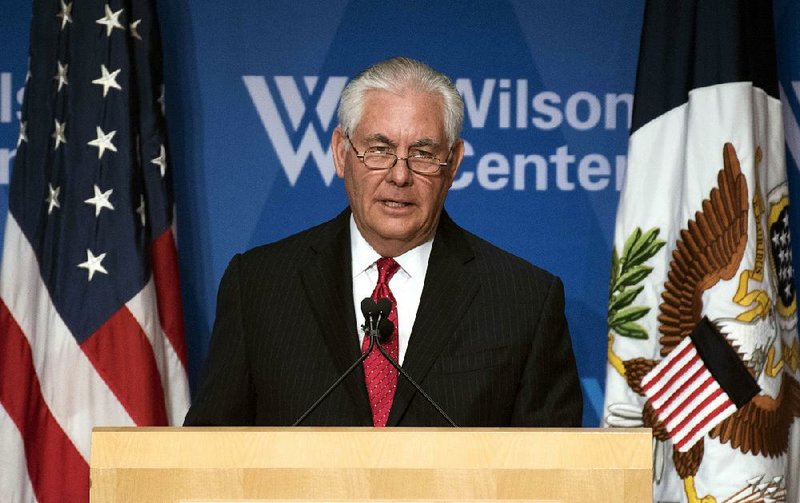WASHINGTON -- Secretary of State Rex Tillerson sought Tuesday to reassure Europe that the United States remains fully committed to European security, particularly in the face of threats from Russia.
Ahead of a trip next week to several European capitals, Tillerson said the U.S. would be the first to respond to any attack on a European ally under NATO's Article 5 mutual defense clause. His comments in a speech to the Wilson Center, a Washington think tank, were intended to dispel unease that President Donald Trump's administration is pulling back from the alliance by demanding that European members spend more on their own defenses.
"Our security relationships with Europe are ironclad," Tillerson said.
"Alliances are meaningless if their members are unable or unwilling to meet their commitments," he said, describing NATO's mutual defense obligation as the "best mechanism we have to deter aggression."
Trump was criticized for repeatedly demanding that European NATO members meet a pledge to spend 2 percent of their federal budgets on defense, which only a handful currently do. Trump even suggested the U.S. might be less willing to defend them if they did not.
Tillerson said the U.S. "will be the first to honor the commitment we have made" in the event of an attack on any ally, noting that the mutual defense clause was invoked for the first time ever after 9/11. He stressed that "nations of Europe must accept greater responsibility for their own security challenges."
Tillerson said Trump's point was that the U.S. cannot afford to pay for Europe's defense itself. He said that since Trump visited Europe, more countries have stepped up defense spending to meet the target.
Tillerson, the former Exxon Mobil chief executive officer who was awarded the "Order of Friendship" by Russian President Vladimir Putin in 2013, took a tough line on Moscow. He criticized its military interventions in Georgia and Ukraine and interference in European elections and politics. He said such actions were unacceptable and not worthy of a responsible member of the international community.
He lamented that attempts to improve relations with Russia by persuading it to change behavior have thus far "proved elusive." He said Russia "continues aggressive behavior" toward its neighbors.
Tillerson said the United States and Europe agree that relations with Russia will not get better until those actions cease. He referred specifically to U.S. and European sanctions imposed on Russia over Ukraine, where Moscow is accused of backing separatist rebels in the country's east.
"Our trans-Atlantic unity is meant to convey to the Russian government that we will not stand for this flagrant violation of international norms," he said.
A Section on 11/29/2017
